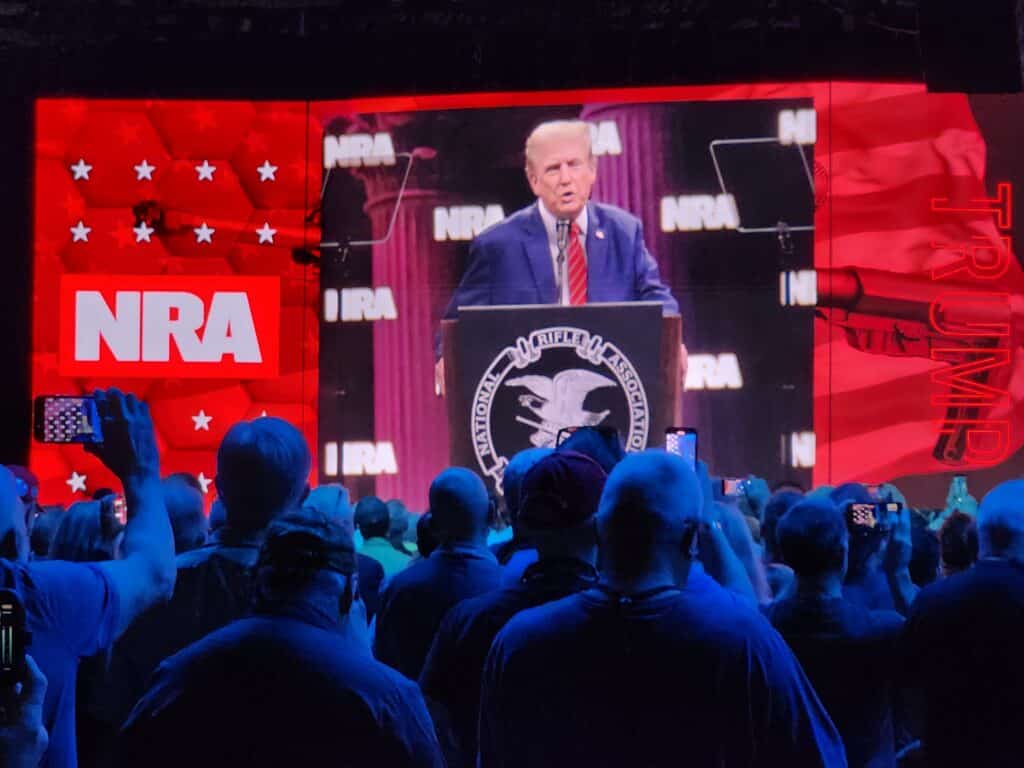It has been a month since the Supreme Court handed down its 8-1 ruling upholding the gun ban for those facing domestic violence restraining orders. That decision in US v. Rahimi ended with a fairly narrow holding, but the way the Court went about getting there has real potential to upend how lower courts handle Second Amendment cases.
So, how have those courts reacted in the short time since Rahimi was released? That’s what Contributing Writer Jake Fogleman is looking at this week.
At the same time, it’s been about a week since a gunman shot former President Donald Trump. We’ve had the RNC come and go without much discussion of guns. So, I work through what all of that might mean for gun politics over the coming weeks, months, and even years. Cam Edwards of Bearing Arms joins the podcast to give his view of what the tumultuous week means for gun owners.

Analysis: How Lower Courts are Applying Rahimi [Member Exclusive]
By Jake Fogleman
In the few weeks since it was handed down, we’ve begun to see the impact of the Supreme Court’s decision in US v. Rahimi. Early indications are it could be limited.
In the highest-profile example so far, the Eighth Circuit Court of Appeals ruled Tuesday that Minnesota’s practice of denying 18-20-year-olds the ability to obtain gun carry permits is unconstitutional. That ruling offered one of the first signs of just how much (or how little) courts might change their practices in Second Amendment cases since the Supreme Court elaborated on how best to perform the history and tradition test it first developed just two years ago.
“Minnesota has not met its burden to proffer sufficient evidence to rebut the presumption that 18 to 20-year-olds seeking to carry handguns in public for self-defense are protected by the right to keep and bear arms,” Judge Duane Benton wrote in Worth v. Jacobson. “The Carry Ban […] violates the Second Amendment as applied to Minnesota through the Fourteenth Amendment, and, thus, is unconstitutional.”
Though it is just one decision, it marked the first appellate-level merits ruling on a Second Amendment challenge since the Rahimi decision, which itself was significant in that it was the first time the Court upheld a law against a Second Amendment challenge following a string of landmark cases going the other direction. In effect, it suggests that lower courts may not interpret the Supreme Court’s last word as a call for added flexibility in their Second Amendment analyses. Not only did the Eighth Circuit uphold the same outcome reached by a District Court before Rahimi, but it specifically cited Rahimi to foreclose one of the Minnesota government’s arguments for upholding the law.
“Minnesota states that from the founding, states have had the power to regulate guns in the hands of irresponsible or dangerous groups, such as 18 to 20- year-olds,” Judge Benton wrote.
“At the step one ‘plain text’ analysis, a claim that a group is ‘irresponsible’ or ‘dangerous’ does not remove them from the definition of the people,” he added, citing language from the Rahimi opinion rejecting a categorical disarmament principle based on irresponsibility.
Throughout the rest of the analysis, however, the panel applied a similar historical inquiry to what many courts did before Rahimi.
“Minnesota did not proffer an analogue that meets the ‘how’ and ‘why’ of the Carry Ban for 18 to 20-year-old Minnesotans,” Benton concluded. “The only proffered evidence that was both not entirely based on one’s status as a minor and not entirely removed from burdening carry—Indiana’s 1875 statute—is not sufficient to demonstrate that the Carry Ban is within this nation’s historical tradition of firearm regulation.”
Of course, Rahimi having a limited bearing on the legal analysis of gun-carry permits for young adults may not be surprising. After all, Rahimi dealt with the federal gun prohibition for persons subject to domestic violence restraining orders, not access to carry permits, and the Court delivered a particularly narrow holding.
“When an individual has been found by a court to pose a credible threat to the physical safety of another, that individual may be temporarily disarmed consistent with the Second Amendment,” the majority held in Rahimi.
But it was the way the majority reached its narrow holding that left some gun-rights advocates worried that the Court had significantly weakened its legal test for Second Amendment lawsuits. Their disappointment and concerns were even shared by Justice Thomas, the architect of that test, in his Rahimi dissent.
Thomas accused the majority of endorsing a loose reading of historical analogies that “defeat[s] the purpose of a historical inquiry altogether.”
“Given that imprisonment (which involved disarmament) existed at the founding, the Government can always satisfy this newly minted comparable-burden requirement,” Thomas wrote. “That means the Government need only find a historical law with a comparable justification to validate modern disarmament regimes. As a result, historical laws fining certain behavior could justify completely disarming a person for the same behavior. That is the exact sort of ‘regulatory blank check’ that Bruen warns against, and the American people ratified the Second Amendment to preclude.”
Thus far, it does not look like Thomas’ worst fears have come to pass. Beyond the Eighth Circuit’s decision on gun permits for young adults, lower courts elsewhere have continued to strike down gun laws, including status-based gun prohibitions like the one at issue in Rahimi.
US District Judge Carlton Reeves, by no means a fan of the Bruen test, also delivered a Second Amendment analysis that seemed unchanged by Rahimi. Earlier this month, he struck down the federal gun ban for undocumented immigrants–at least as applied to the defendant in the case.
“The Fifth Circuit has found that ‘Bruen clearly fundamentally changed our analysis of laws that implicate the Second Amendment, rendering our prior precedent obsolete,’” he wrote in US v. Benito. “And the Supreme Court’s latest decision in Rahimi didn’t disagree with that premise in the slightest. Although the Justices parted ways with the Fifth Circuit’s outcome, they doubled down on the legal standard they articulated in Bruen.”
As a result, he subjected the case to a comparatively stringent analysis under Bruen and determined that undocumented immigrants are “presumptively protected” by the text of the Second Amendment. Under what he called the “Bruen-Rahimi standard,” he said the government would only be able to justify disarming the defendant if he were found to be dangerous because the High Court only endorsed “the principle that American history and tradition support disarmament of dangerous persons.”
“But Mr. Benito has never been convicted of a crime, much less a dangerous crime, so he can’t be disarmed yet,” he concluded.
Even courts that have upheld gun-control laws in Rahimi‘s aftermath have not relied on its reasoning to do so. A three-judge panel for the Third Circuit Court of Appeals on Monday denied a request for preliminary injunction against Delaware’s “assault weapon” and “large-capacity magazine” bans in an opinion that cited Bruen at least 27 times and Rahimi precisely zero times. And, while the majority’s reasoning hinged solely on the grounds that not granting the injunction would not result in “irreparable harm,” another member of the panel wrote separately in a concurrence that she would have ruled on the merits that AR-15s are not even “arms” protected by the Second Amendment—a common argument from judges that pre-dates Rahimi and also did not even cite the decision.
Of course, things are early, and the evidence doesn’t unanimously point toward Rahimi having no impact on Second Amendment cases. One of the first lower court decisions to cite it, upholding criminal charges for possessing unregistered machinegun conversion devices against a Second Amendment challenge, did endorse the view that Rahimi watered down the Bruen test–at least somewhat.
“I do not believe Herriott’s constitutional rights are being violated, and the National Firearms Act statutes remain constitutional after Bruen (and after Rahimi as well),” Judge Philip Simon wrote in US v. Herriott. “If anything, Rahimi can be seen as a softening of the approach to the Second Amendment taken in Bruen. How else does one explain that the author of Bruen is the sole dissenter in Rahimi?”
It’s possible that a more significant split over Rahimi‘s impact on Second Amendment cases will begin to emerge over time. However, the way lower courts have handled gun cases hasn’t changed much yet.
Podcast: The Fallout of the Trump Assassination Attempt and RNC on Gun Politics (Ft. Cam Edwards) [Member Early Access]
By Stephen Gutowski
It has been just over a week since somebody shot and tried to kill Donald Trump. In that time, the RNC has come and gone. Gun policy was nowhere to be found.
What does all that mean for the short and long-term prospects of the gun-rights movement?
That’s the question we’ve brought Bearing Arms editor Cam Edwards on to the show to help us answer. He’s one of the best gun writers in the country, and he brings a complementary but unique view of where this is all headed.
Cam argued the silence on the Second Amendment at the RNC was evidence the gun-rights movement’s continued reliance on a single party for its influence is a real risk. However, he also said Trump’s assassination attempt may not drive new gun restrictions like some others in American history have. And he argued the GOP’s newfound skittishness toward gun politics could actually reverse if the race tightens than the other way around.
You can listen to the show on your favorite podcasting app or by clicking here. Video of the episode is available on our YouTube channel. An auto-generated transcript is available here. Reload Members get access on Sunday, as always. Everyone else can listen on Monday.
Claim your free 30-day trial at this week’s sponsor The Dispatch here!
Plus, Contributing writer Jake Fogleman and I cover the 2024 RNC coming to a close. We then turn to a recapping of where things stand with the NRA in the second phase of its New York corruption trial. Finally, we wrap up with a discussion of a new appeals court ruling upholding gun carry rights for young adults, Massachusetts’ new omnibus gun control bill, and the Ninth Circuit’s decision to vacate yet another Second Amendment ruling.

Analysis: Will the Trump Assassination Attempt Scramble Gun Politics? [Member Exclusive]
By Stephen Gutowski
Just days before the Republican National Convention opened up to officially nominate former president Donald Trump as its 2024 candidate for the same role, a 20-year-old Pennsylvania man shot him with an AR-15 in an assassination attempt that wounded his ear but left two others in critical condition and one rally attendee dead.
That event has the potential to create a seachange in gun politics and policy. After all, similar events have been the catalyst for most major American gun laws. And there have been some attempts to turn the shooting into a call for new gun control.
“An AR-15 was used in the shooting of Donald Trump,” President Joe Biden said on Tuesday, repeating a common theme of his re-election campaign that numerous gun-control groups echoed. “This was the assault weapon that killed so many others, including children. It’s time to outlaw them.”
But those calls have garnered little attention. Our gun politics appear surprisingly stable for now, but that may not last.
For one, assassinations and assassination attempts have previously led to major American gun control. The Gun Control Act of 1968 came after multiple high-profile assassinations of American political leaders, including President John F. Kennedy. The Brady Act is literally named after Ronald Reagan’s press secretary, who was severely injured during the 1981 attempt on his life.
Trump has a relatively uneven record on guns. It’s one that’s easily more pro-gun than his rival Joe Biden, who is running on the most aggressive gun-control platform in a generation. But it’s also one that features a number of caveats.
Perhaps most relevant is that he publicly called for an “assault weapons” ban in his 2000 book “The America We Deserve,” and he reportedly considered backing a ban on ARs after the El Paso Walmart shooting. And that was before somebody shot him with one.
But he also publicly considered supporting red flag laws after the Parkland shooting, infamously saying, “Take the guns first, go through due process second.” He did unilaterally implement a bump stock ban after the Las Vegas shooting, which the Supreme Court later ruled unlawful.
That’s in contrast with other parts of his record, of course. He appointed three of the six justices who ruled in favor of a landmark pro-gun ruling that set up a new standard for Second Amendment cases moving forward. They also ruled against his bump stock ban. He also signed the repeal of a late-era Obama regulation restricting guns for certain Social Security beneficiaries, designated gun businesses essential during the pandemic, and made a few other smaller pro-gun moves during his presidency.
He has also spoken to the National Rifle Association twice this year, with the group claiming he’ll do another event with them this season. Those speeches have included a myriad of gun-policy promises. He also launched Gun Owners for Trump at the NRA convention.
But that seems to have changed.
Republicans deleted gun-policy promises from their 2024 platform. The NRA wasn’t invited back to give a speaking slot at the RNC after having one in 2016. Trump gave the longest acceptance speech in history and didn’t mention gun policy a single time–not even the generic promise to protect the right to keep and bear arms featured in the platform. There were no gun-rights speakers at the RNC. The issue was relegated to an off-site event hosted by the United States Concealed Carry Association and a few comments in various speeches.
Most notably, JD Vance relayed an anecdote about how his family found 19 loaded guns in his grandmother’s home after her death. He said Republicans remain the party of people like her, who want to protect their family members. Like the Republican platform, that was a platitude rather than a specific policy promise.
But Vance also has a pro-gun record that’s likely to boost the ticket’s credentials among gun voters. As a 39-year-old elected to the Senate from Ohio in 2022, he doesn’t have a very long record. However, it is one that includes votes for a series of gun-rights bills and against a series of gun-control measures. He has also been about as rhetorically pro-gun as any politician during that time.
Still, Vance’s defining characteristic as a politician has been his willingness to bend and remake himself in Trump’s image. His initial rise to prominence was as a conservative author embraced largely by mainstream and left-leaning outlets over his portrayal of life in Appalachia. When Trump ran for president the first time around, he was deeply critical in public and even wondered privately whether he could be “America’s Hitler.” By 2020, like many other Republican holdouts, his tune changed dramatically.
Vance more or less owes his political career and its meteoric rise to Trump and his flip-flop on him. So, he would probably go along with Trump if he decided to change tact on the issue.
Not that it’s certain he will change tact by any means. All he and the party have done to this point is go quiet on gun policy. They haven’t actually announced or even teased any changes in their policy positions.
But it’s fair to say the issues moderated or dropped from the GOP platform, RNC speaking roles, and Trump’s acceptance speech are, at the very least, ones they’re not confident are helping them win re-election. Those are the areas they’re most likely to soften on if need be. It hasn’t happened yet with gun policy, but Trump is polling better than at this point in his previous two campaigns.
If and when the polls tighten, their tune on guns could change. It could be something less drastic than matching Biden’s call for an outright ban on the sale of AR-15s. They could go for red flag proposals or an AR ban specific to 18-to-20-year-olds.
Either way, if Trump is re-elected and pushes for new gun restrictions, he’s more likely to get them than if the same happens with Joe Biden. Trump can move Republicans on guns, or any other policy for that matter, better than Biden can. Democrats would, of course, be happy to go along for the ride.
Even if Trump never pushes for gun restrictions, that wouldn’t necessarily preclude some being passed as a result of his assassination attempt. The Brady Act didn’t pass until 1993, years after Reagan left office. So, while gun politics haven’t transformed in the few days since Trump was shot, they could change dramatically in the mid-to-long term.
That’s it for now.
I’ll talk to you all again soon.
Thanks,
Stephen Gutowski
Founder
The Reload







